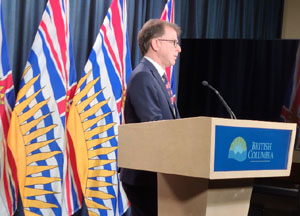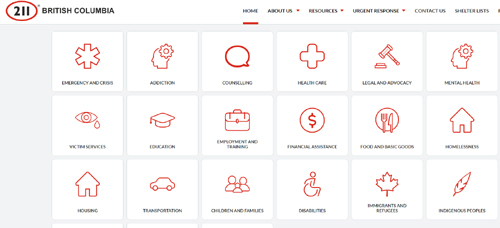Tuesday May 9, 2023 | VICTORIA, BC
by Mary P Brooke | Island Social Trends
Expanded supports to help older adults stay independent and living in their own homes includes strengthened delivery of the United Way of British Columbia’s Better at Home, bc211 and community-based programs.
Health Minister Adrian Dix and Harwinder Sandhu, Parliamentary Secretary for Seniors’ Services and Long-Term Care made the announcement today in Burnaby.
Some older persons continue working past 65 for financial reasons, but even in that age bracket may need additional supports.
Today Dix notably referred to “seniors and elders”, as part of a growing differentiation in the vast age range of older people, which might range from age 55 and up.

Dix said the $70 million announced today shows the government’s “confidence in the United Way” and “the need to deliver services for seniors in community”. This type of support “reflects the reality of today”, said Dix, allowing people to live better at home.
What we need at 67 is different than what is needed at 85, said Dix, as a way to sketch the range of services required. “Simply having supports that are medical is not sufficient for people to live well and live in community,” he pointed out. The choice to move from a house or apartment is based on much more than just direct medical needs, the Health Minister said.
“What we’re doing today is one of the one of the most significant things we can do to build a better future for BC seniors,” said Dix.

Living at home:
“We know seniors want to be supported to live independently in their communities for as long as possible,” said Adrian Dix, Minister of Health. That is, of course, in contrast to the alternative of living in long-term care or assisted-living facilities that are more costly to the provincial health-care system overall.
“That’s why from 2018 to 2022, our government has significantly expanded the funding for this program to $132 million up from $36 million between 2012 and 2017. Today’s investment demonstrates our commitment to caring for and supporting our seniors so they can continue living in their own homes, close to their families and friends,” said Dix.
Altogether the aim is to help seniors live at home safely including through a reduced sense of isolation, said Dix. Social isolation has been shown to negatively impact health as much as other more obvious factors.
“It reduces the stigma to ask for help when needed,” he said about the expanded reports, in today’s media session.
The boost in funding is “because (the United Way delivery of services) has been helpful for seniors to help them continue living at home,” said Dix. The bc211 hotline is also receiving more funding 15,500 social services and programs, which Dix described as an “extraordinary and remarkable resource for older adults”.
Active and engaged:
Michael McKnight, president and CEO, United Way British Columbia said that the aim is for seniors to remain active, connected and engaged in their local community.
“Everyone should have the opportunity and support to age at home and remain active in their community for as long as possible,” said Sandhu.
“Expanding the Better at Home supports through United Way means more seniors around the province can get help with the non-medical tasks, such as grocery shopping, minor home repairs, yard work, transportation to appointments and light housekeeping. Through my work as a community nurse, I have seen first-hand the benefits of these community-based seniors’ services in reducing the sense of isolation for some seniors and helping most live safe and fulfilled lives in their homes,” Sandhu said.
Dix noted that seniors care and food security aspects of that “played a role” for seniors during the COVID pandemic. He added that during the pandemic there was some “uncertainty” about how seniors support such as day programs would continue to be delivered. He said the United Way “truly stepped up at that time”.
$70 million investment:
The Province is investing $70 million over two years to expand the Better at Home program to nine more communities, continue the bc211 program and continue community-based projects that reach people who might not otherwise have access to community services. | Link to Better At Home for the Victoria Capital Region
“The day-to-day type of supports offered through the Better at Home program are key to allowing seniors to age in their own homes and in their own communities,” said Isobel Mackenzie, B.C.’s seniors advocate. “These vital services provide seniors with the help they need and give family members peace of mind.”
More than 90 Better at Home programs serve more than 260 communities through provincial funding for the United Way of British Columbia. From April 1, 2021, to March 31, 2022, the program delivered 255,082 services to 12,888 seniors throughout the province.
Increased investment under NDP government:
The Province’s investment in Better at Home has increased under the NDP government since 2017.
During the fiscal years 2012-13 to 2015-16 the investment was in the $2 million to $5 million range and $10 million in 2016-17.
Starting with the 2017-18 fiscal year the investment was $10 million (though for some reason dropped to $6.6 million in 2018-19) but jumped to $55.4 million in 2019-20 (which included the pandemic phase) and reached $70 million (for over two years) in 2022-23.
United Way is the key partner:
“We are looking forward to continuing to work with the Province of British Columbia and our partners in the community-based seniors services’ sector in supporting older adults to remain active, connected and engaged in their communities, and thrive and live dignified lives in their own homes,” said Michael McKnight, president and CEO, United Way British Columbia.
“We look forward to strengthening vital connections across diverse communities in our province.”
Dix thanked United Way staff, volunteers and contributors.
bc211 help line:
Offered in more than 150 languages, bc211 is available 24 hours a day and connects people to more than 15,500 free social supports, services and community programs throughout the province.
Through bc211, seniors can find information about social and recreation programs, transportation options and meal programs to help them stay active and connected in their community.
Better at Home:
Seniors can apply for services by contacting the Better at Home Program Provincial Office at 604 268-1312, or emailing info@betterathome.ca. There is also a directory of local community organizations.
The program is managed by the United Way of British Columbia’s healthy aging initiative.
Link: Better At Home for the Victoria Capital Region.
Community-based projects:
Funding will also continue community-based projects for seniors who need extra help to access supports, including the therapeutic activation program for seniors, social prescribing program, family and friend caregiver support program, and the navigation and peer support program. These demonstration projects will help develop more services and meet the changing needs of seniors.
Five-year investment:
To meet growing demand, government has invested approximately $2 billion over the past five years to expand and improve quality care for seniors in British Columbia, including investments in primary care, home health, long-term care and assisted living.









